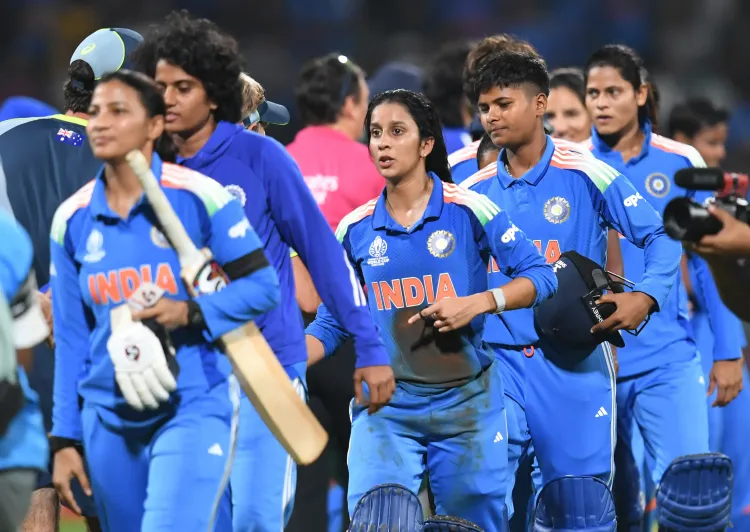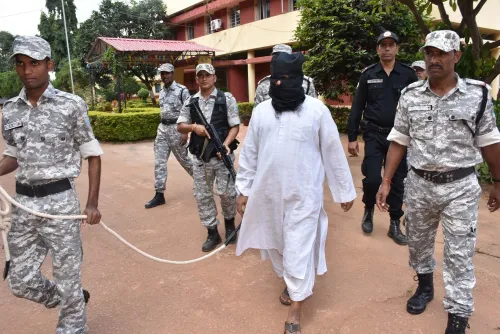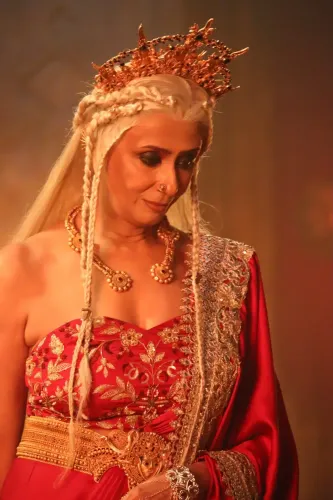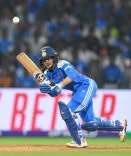How Did India Achieve a Historic Run Chase to Reach the Women’s World Cup Final?

Synopsis
Key Takeaways
- Historic win for India in Women’s World Cup semifinal.
- Jemimah Rodrigues scored an unbeaten 127.
- India chased down 339 runs, marking the highest chase in ODI World Cup history.
- Partnership of 167 runs between Jemimah and Harmanpreet.
- India's third World Cup final appearance.
Navi Mumbai, Oct 30 (NationPress) India executed one of the most remarkable comebacks in the annals of the ICC Women’s ODI World Cup, successfully pursuing a colossal 339 to defeat the reigning champions Australia by five wickets during the semifinal at the DY Patil Stadium in Navi Mumbai on Thursday.
The victory, clinched at 341 for 5, marked the highest successful run chase in the history of an ODI World Cup knockout match across both men’s and women’s formats, eclipsing New Zealand men’s achievement of 299 for 6 against South Africa in the 2015 semifinal.
This triumph propelled India into their third Women’s World Cup final, following their appearances in 2005 and 2017, while also breaking Australia’s impressive 15-match unbeaten streak in World Cups, which had been ongoing since 2022.
The spotlight shone brightly on Jemimah Rodrigues, who delivered an unforgettable performance with an unbeaten 127, marking her first World Cup century and her third ODI ton overall. Shortly before entering the field, she was elevated to the number three position and played a crucial role in leading India’s chase to victory.
In collaboration with captain Harmanpreet Kaur, who contributed a stylish 89, Jemimah forged a remarkable 167-run partnership for the third wicket — the highest ever against Australia in Women’s World Cup history and India’s best in a knockout match.
This partnership broke the previous Indian record of 137 set by Harmanpreet and Deepti Sharma in the 2017 semifinal in England and interrupted Australia’s previous monopoly on partnerships exceeding 150 in knockout rounds, as all five previous records belonged to Australian players, including a 155-run partnership earlier in the day.
Australia, having chosen to bat first, seemed poised for another commanding display, finishing with 338. Phoebe Litchfield’s 119 anchored the innings, aided by Ellyse Perry’s 77 and a late flourish of 63 off 45 balls from Ashleigh Gardner.
Despite the impressive totals, India’s bowlers performed admirably, with Nallapureddy Shee Charani taking 2 for 49 and Deepti Sharma securing 2 for 73, preventing the Australians from surpassing the 350 mark.
India's chase began poorly, with openers Shafali Verma (10) and Smriti Mandhana (24) dismissed early, leaving the team struggling at 47 for 2. However, Jemimah and Harmanpreet steadied the innings, skillfully rotating the strike and maintaining the required run rate.
Following the dismissal of the captain, crucial contributions from Deepti Sharma (24), Richa Ghosh (26), and Amanjot Kaur (15 not out off 8) ensured India maintained control of the chase. Amanjot hit the winning runs, prompting Jemimah to kneel in tears, overwhelmed by the significance of the moment.
The statistics tell the tale of an unforgettable night for Indian cricket. The chase of 341 for 5 is not only the highest in Women’s World Cup history but also India’s best successful run chase in Women’s ODIs, surpassing their previous record of 266 for 8 against Australia in Mackay in 2021.
In Women’s ODI World Cup knockout matches, it exceeded England’s 221 for 8 against South Africa in the 2017 semifinal and Australia’s 181 for 1 against South Africa in the 2000 semifinal. This victory also marks India’s third successful chase of over 300 runs in 2025, following successful pursuits of 331 against Australia in Vizag and 259 against England in Southampton earlier this year.
Australia’s historic unbeaten streak has now come to an end. Their 15-match unbeaten run in World Cups — a record matched only once before between 1997 and 2000 — concluded in Navi Mumbai, where India made history.
The outcome also means India’s total of 341 for 5 is now the highest successful run chase ever achieved by any team in an ODI World Cup knockout, whether men’s or women’s, surpassing New Zealand’s 299 for 6 against South Africa in 2015 and Australia’s 289 for 4 against New Zealand in the 1996 quarterfinal.









